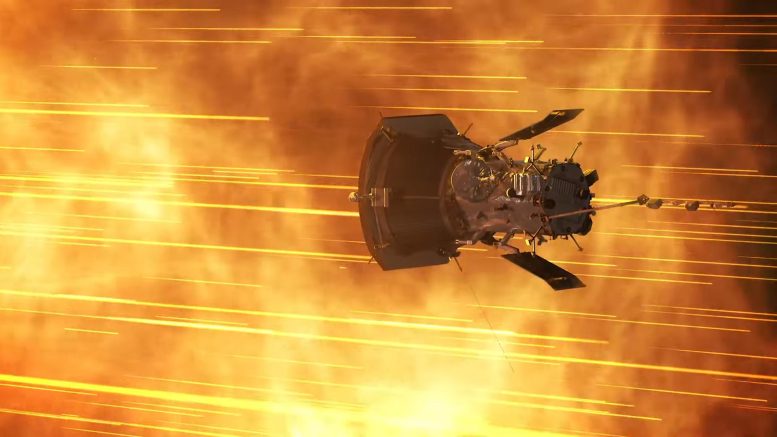Parker Probe’s Closest Sun Encounter at 394,736 Miles per Hour


The Parker Solar Probe completed its 20th close approach to the Sun, matching previous records in both distance and speed. It reported back in good health and is scheduled for three more approaches in 2024, with one featuring a reduced proximity to the Sun after a Venus flyby. Credit: NASA GSFC/CIL/Brian Monroe
NASA’s Parker Solar Probe successfully completed its 20th close approach to the Sun on June 30, 2024.
NASA’s Parker Solar Probe completed its 20th close approach to the Sun on June 30, 2024, matching its own distance record by coming about 4.51 million miles (7.26 million kilometers) from the solar surface.
The close approach (known as perihelion) occurred at 3:47 UTC (11:47 p.m. EDT on June 29), with Parker Solar Probe moving 394,736 miles per hour (635,266 kilometers per hour) around the Sun, again matching its own record. On July 2, the spacecraft checked in with mission operators at the Johns Hopkins Applied Physics Laboratory in Laurel, Maryland (where the spacecraft was also designed and built), with a beacon tone indicating it was in good health and all systems were operating normally.
Parker Solar Probe’s 20th orbit included a perihelion that brought the spacecraft within 4.51 million miles of the Sun. Credit: NASA/Johns Hopkins APL/Steve Gribben
The milestone also marked the midpoint in the mission’s 20th solar encounter, which began June 25 and continues through July 5.
Parker will fly around the Sun at the same distance and speed one more time this year — on September 30 — before making the first of its three final planned closest approaches on December 24. At that point, with Parker’s orbit shaped by the mission’s final Venus gravity assist-flyby on November 6, the spacecraft will zoom just 3.8 million miles from the solar surface, moving about 430,000 miles per hour.



